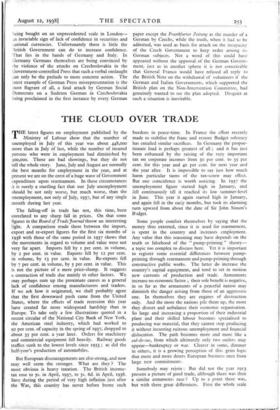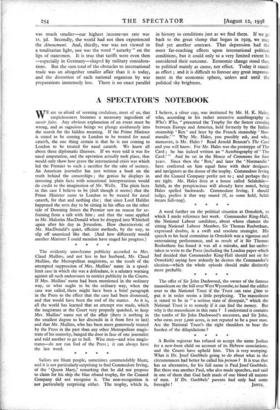THE CLOUD OVER TRADE
The falling-off in trade has not, this time, been correlated to any sharp fall in prices. On that some figures in the Board of Trade Journal throw an interesting light. A comparison made there between the import, export and re-export figures for the first six months of 1938 with those of the same period in 1937 shows that the movements in regard to volume and value were not very far apart. Imports fell by 1 per cent. in volume, by 2 per cent. in value. Exports fell by 12 per cent. in volume, by 13 per cent. in value. Re-exports fell by 7 per cent. in volume, by 5 per cent. in value. This is not the picture of a mere price-slump. It suggests a contraction of trade due mainly to other factors. We may perhaps sum up the proximate causes as a general lack of confidence among manufacturers and traders. If we ask how it originated, we shall probably agree that the first downward push came from the United States, where the effects of trade recession this year have created far more widespread hardship than in Europe. To take only a few illustrations quoted in a recent circular of the National City Bank of New York, the American steel industry, which had worked to 92 per cent. of capacity in the spring of 1937, dropped to about 35 per cent. a year later. Orders for machinery and commercial equipment fell heavily. Railway goods traffics sunk to the lowest levels since 1933 ; as did the half-year's production of automobiles.
But European disconragements are also strong, and now may well seem the stronger. What are they ? The most obvious is heavy taxation. The British income- tax rose to 5s. in April, 1937, to 5i. 6d. in:April, 1938. Save during the period of very high inflation just after the War, this country has never before borne such burdens in peace-time. In France the effort recently made to stabilise the franc and restore Budget solvency has entailed similar sacrifices. In Germany the propor- tionate load is perhaps greatest of all ; and it has just been enhanced by the raising of the very important tax on corporate incomes from 3o per cent. to 35 per cent. for this year and 4o per cent. for next year and the year after. It is impossible to say just how much harm particular turns of the tax-screw may effect. But one coincidence is worth noticing. In 1937 the unemployment figure started high in January, and fell continuously till it reached its low summer-level in June. This year it again started high in January, and again fell in the early months, but took its alarming turn upward from about the date of Sir John Simon's Budget.
Some people comfort themselves by saying that the money thus extorted, since it is used for rearmament, is spent in the country and increases employment. Any value that this reasoning may have depends on the truth or falsehood of the " pump-priming " theory— a topic too complex to discuss here. Yet it is important to register some essential differences between pump- priming through rearmament and pump-priming through constructive public works. The latter do increase the country's capital equipment, and tend to set in motion new currents of production and trade. Armaments increase no economic factor ; their sole benefit is negative, in so far as the armaments of a peaceful nation may diminish the danger arising from those of an aggressive one. In themselves they are engines of destruction only. And the more the nations pile them up, the more they distort and unbalance their economic organisation. So large and increasing a proportion of their industrial plant and their skilled labour becomes specialised to producing war material, that they cannot stop producing it without incurring ruinous unemployment and financial dislocation. The path becomes more and more like a cul-de-sac, from which ultimately only two outlets may appear—bankruptcy or war. Clearer itt some, dimmer in others, it is a growing perception of this grim logic that more and more deters European business men from large new commitments.
Somebody may rejoin : But did not the year 1913 present a picture of good trade, although there was then a similar armaments race ? Up to a point there was, but with three great differences. First the whole scale was much smaller—our highest income-tax rate was Is. 3d. Secondly, the world had not then experienced the denouement. And, thirdly, war was not viewed in a totalitarian light, nor was the word " autarky " on the lips of statesmen. It is true that tariffs were even then —especially in Germany—shaped by military considera- tions. But the sum total of the obstacles to international trade was an altogether smaller affair than it is today, and the distortion of each national organism by war preparations immensely less. There is no exact parallel in history to conditions just as we find them. If we go back to the great slump that began in 1929, we may find yet another contrast. That depression had the most far-reaching effects upon international political conditions, but it could only to a very limited extent be considered their outcome. Economic change stood then to political mainly as cause, not effect. Today it stands as effect ; and it is difficult to foresee any great improve- ment in the economic sphere, unless and until the political sky brightens.







































 Previous page
Previous page